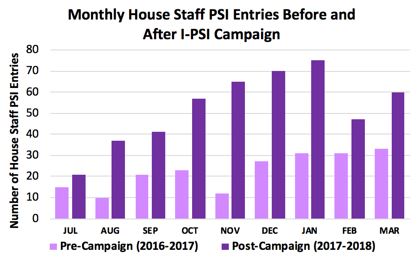Background: Voluntary incident reporting systems are an essential component of a high reliability organization (HRO). Historically, housestaff contribute just 1% of all patient safety intelligence (PSI) events reported at our tertiary care academic institution. This is a missed opportunity, as housestaff spend a significant amount of their time in direct patient care and can see first-hand the lapses in patient safety. Our aim was to significantly increase the number of patient safety events reported by housestaff by launching the institution-wide “I-PSI” campaign. The campaign is founded on accountability and empowerment: “If I see something unsafe I have a duty to report this event.”
Methods: The I-PSI campaign was launched by the Housestaff Patient Safety Council, mentored by Hospital Medicine. We conducted several housestaff-only focus groups and concluded that the low reporting was due mostly to three factors: poor awareness/ understanding, a lack of empowerment and inconsistent (often no) feedback. Our campaign consistent of: 1.) lectures to 15 departments to heighten awareness and importance, showing department-specific data, 2.) individualized email to each housestaff who submitted a patient safety report thanking them for taking the time to improve our system, 3.) using a housestaff-entered patient safety report to inform patient safety conferences across the campus, 4.) engaging key faculty to model and mentor PSI entry, 5.) celebrating the growing numbers with senior hospital leadership, GME leadership and front-line staff.
Results: Year-over-year analysis demonstrates an increase in the number of housestaff PSI events reported each month since the start of the campaign in July 2017. There was a 239% increase in housestaff placed PSIs compared to the same period last year. Departments who contributed the most are Medicine, Pediatrics and Emergency Medicine.
Conclusions: The I-PSI campaign is a highly portable, effective effort to increase patient safety event reporting amongst our trainees. In addition to harnessing the suggestions to improve patient safety from front-line staff, it teaches accountability and empowerment.

